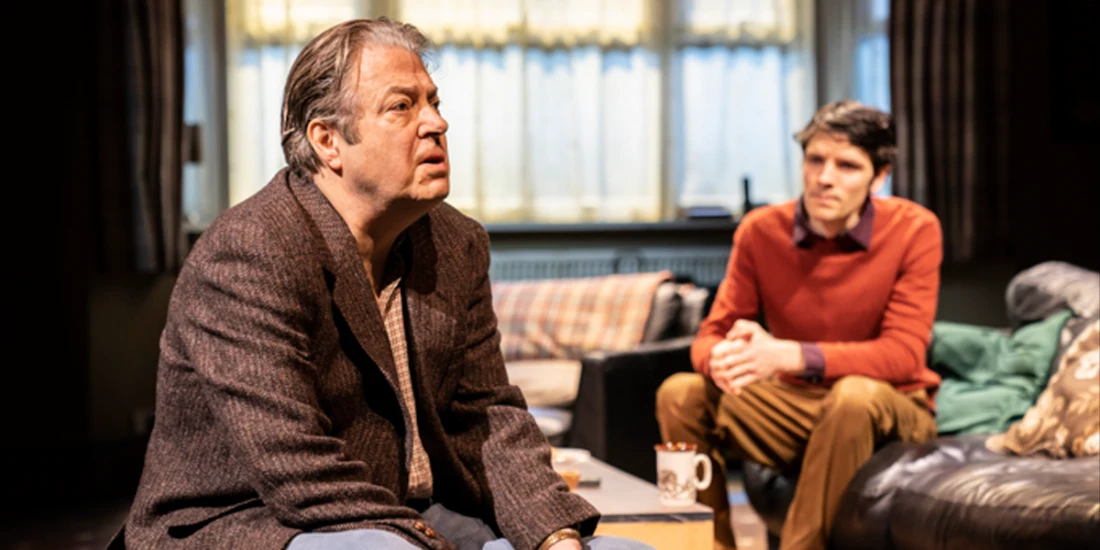Review - Caryl Churchill's A Number at the Bridge Theatre
At 81, Caryl Churchill is still going strong: last year, the Royal Court premiered a quartet of her latest short plays, Glass. Kill. Bluebeard. Imp., while the National revived possibly her most famous play, Top Girls.
And now, just a week after the Donmar Warehouse revived her 2000 play Far Away, the Bridge Theatre now revives the play that came immediately afterwards, A Number, in 2002. All of these plays were originally premiered at the Royal Court, and it's fascinating to see all of these other prominent theatres now following in their slipstream, yet still creating significant waves of air pressure so many years later.
The moment to reappraise and reconsider her legacy, while she is happily still amongst us (and was seated two rows behind me at the Bridge at the opening of A Number), proves that her plays aren't just hot air, liable to deflate like a pricked balloon on being exposed to different creative teams. As I wrote last year in my review of Glass. Kill. Bluebeard. Imp., "More than one critic has already described Churchill, now 81, as our greatest living playwright. That's inevitably a subjective call, and though I wouldn't go as far, she's long been one of our most consistently adventurous."
A Number offers a bold, challenging and frequently chilling proposition: what if our individual uniqueness was somehow compromised by the science of cloning, with replicas of ourselves living other lives elsewhere? Here we meet three of them (B1, B2, and Michael); there are said to be more than twenty, and scenes unfold in which each meet their biological father Salter and try to reach an understanding of where they fit in.
I've written before of how it is sometimes impossible to untangle an experience of watching a play from one's own relationship to the subject matter; and as someone who is even now in the midst of trying to properly come to terms with dysfunction in my own family of origin, particularly in my relationship to my father through the help of a 12-step programme, the play hits a particularly raw nerve. (In my own family, there's even the existence of a half-brother I've never met who was born before I was, and never found out about until I was in my thirties). I could easily imagine myself sitting in the fellowship rooms hearing one of these siblings sharing their stories of abandonment and dysfunction. Yet, the play also offers a ray of hope, as you often hear in the rooms, too, as one of the sons actually turns out happy with his life.
Father and son(s) are played by the same actors: Roger Allam and Colin Morgan here, both of them massively accomplished stage actors who've also achieved screen fame (Allam for Endeavour and The Thick of It; Morgan for Merlin); they've even appeared opposite each other previously onstage in The Tempest at Shakespeare's Globe, playing Prospero and Ariel respectively, in 2013. Allam has the right shuffling embarrassment and uneasiness as he is confronted by each of his children; Morgan switches effortlessly from curiosity to anguish to unburden. It's a journey I hope to be able to complete myself. Theatre, meanwhile, provides a safe place to explore these feelings through the prism of fictional characters.
Director Polly Findlay's meticulous and moving production fills the large space of the Bridge with a constantly changing parade of rooms in the family home (designed by Lizzie Clachan, who did similarly instantaneous resettings for Far Away at the Donmar). The play remains startling and, for me, even more relevant than when I first saw it at the Royal Court in 2002, when the roles were played by Michael Gambon and Daniel Craig. In the years since, I've also seen real-life father and son teams play it - Timothy and Samuel West at the Menier Chocolate Factory, and John and Lex Shrapnel at Southampton's Nuffield Theatre, which gave it an even richer fascination and texture.
But though Allam and Morgan are unrelated in life, this father-son double act is a tense and wounding encounter.
A Number is at the Bridge Theatre until 14th March.
Originally published on
